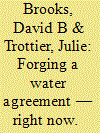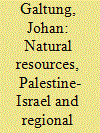|
|
|
Sort Order |
|
|
|
Items / Page
|
|
|
|
|
|
|
| Srl | Item |
| 1 |
ID:
134832


|
|
|
| 2 |
ID:
134833


|
|
|
|
|
| Summary/Abstract |
Al-‘Eizariya (Bethany) is one of East Jerusalem’s eastern neighborhoods located on the historic Jerusalem-Jericho route, two miles from Jerusalem. The reality of al-’Eizariya has changed dramatically in the last two decades. After the Oslo Accords (1993) were signed, al-‘Eizariya expanded to accommodate the flood of migrants who arrived due to an economic boom and the political expectation that it would be part of the future capital of the state of Palestine. All this economic growth has since been disrupted by the failure of the Oslo Accords1 and the construction of the Separation Wall beginning in 2002.2
|
|
|
|
|
|
|
|
|
|
|
|
|
|
|
|
| 3 |
ID:
134828


|
|
|
|
|
| Summary/Abstract |
Usually when the massive plates that float over the Earth’s molten core collide, the intense pressure over millions of years pushes the land upward. It is this force that has created some of the world’s most breathtaking mountain ranges. About 80 million years ago, for some reason, when the Asian plates encountered the African and European plates this wasn’t the case. Instead of the earth lurching upwards towards the sun, the plates separated, creating the volatile Syrian East African Rift Valley: A valley that includes the world’s lowest point — the Dead Sea — 427 meters below sea level.
|
|
|
|
|
|
|
|
|
|
|
|
|
|
|
|
| 4 |
ID:
134811


|
|
|
|
|
| Summary/Abstract |
All through the millennia of its environmental history, the Middle East1 has seen little change. The region’s environmental mosaic of Mediterranean, semi-arid and arid landscapes, with the two great river systems of the Nile and the Jordan, has remained relatively stable, in spite of the fact that there have been periods of cold, drought and aridity. Mediterranean seashore settlements were involved in maritime trade, riverbanks have been places of irrigated agriculture (and regular and irregular floods) and semi-arid lands provided for nomadic and semi-nomadic pastoralists.
|
|
|
|
|
|
|
|
|
|
|
|
|
|
|
|
| 5 |
ID:
134831


|
|
|
|
|
| Summary/Abstract |
Although resolution of the issues related to fresh water shared by Israel and Palestine will not bring about peace between the two peoples, in the absence of a just resolution of water issues, no peace can be complete. Furthermore. in the absence of sustainable use of water by both peoples, overall social and economic development will be threatened. and so too will peace for the region.
|
|
|
|
|
|
|
|
|
|
|
|
|
|
|
|
| 6 |
ID:
134829


|
|
|
|
|
| Summary/Abstract |
On May 26, 2013. U.S. Secretary of State John Kerry, addressing the World Economic Forum on the Middle East and North Africa, unveiled his plan for the Palestinian Economic Initiative, stating: “It is time to put in place a new model of development that is bigger and bolder than anything proposed since the Oslo Accord."‘ However, this paper argues that far from awarding the belligerent occupant a transformative license to utilize inter alia the natural resources of the occupied territory for economic development, these resources are instead limited by reference to Article 55 of the Hague Regulations. The Palestinian Economic Initiative.
|
|
|
|
|
|
|
|
|
|
|
|
|
|
|
|
| 7 |
ID:
134813


|
|
|
|
|
| Summary/Abstract |
Looking closely at Israel’s obligations over Palestinian natural resources, we can see that Israel, as an occupying power, does not obtain sovereignty over the West Bank, East Jerusalem or the Gaza Strip, and acts as an administrator of the land as long as the occupation continues.
|
|
|
|
|
|
|
|
|
|
|
|
|
|
|
|
| 8 |
ID:
134815


|
|
|
|
|
| Summary/Abstract |
During the last five years Israel was blessed with significant natural gas discoveries in the deep water of its Mediterranean coast. The Tamar and Leviathan gas fields were the largest discovered in the world in the past decade. The use of this gas will benefit Israel directly to the tune of US$6 billion per annum. In addition to the potential boost to Israel’s economy, it gives the country a unique opportunity to meaningfully change its economic and energy relations with the region — as long as politics do not stand in the way.
|
|
|
|
|
|
|
|
|
|
|
|
|
|
|
|
| 9 |
ID:
134825


|
|
|
|
|
| Summary/Abstract |
The global environmental movement is a vast. largely LlnC00[‘(environmental movement that spans all strata of society. Included \\llllln its ranks LITL ifiolificians at the national. regional and local levels; radical international actors ; writers; lobbyists: middle school students who run awareness fiampaigns; philosophers and communities. In recent years. the mm cmcm has had considerable influence on all spheres of life in the intcmmionztl In this paper I will explore some of the lessons that can be tlruun from the movement to be applied to transforming the conflict in Israel- Palestine.
|
|
|
|
|
|
|
|
|
|
|
|
|
|
|
|
| 10 |
ID:
134826


|
|
|
|
|
| Summary/Abstract |
This paper advocates using environmental data as a basis for cross-border entities to work toward integrated watershed management and discusses lessons learned through involving stakeholders in this process. Based on our experience with water and wastewater issues in the Middle East, we have adapted an integrated watershed management approach in response to local challenges such as underdeveloped infrastructure, asymmetric institutional capacities and political conflict. At present, our project work provides decentralized (bottom-up) solutions and, in doing so, develops stakeholder networks that can effect integrated watershed management in the long term. The solution is two-fold — to create a data platform that will serve as an analytical tool to guide water management decisions and, simultaneously, to create a stakeholder forum for cultivating ongoing cross-border relationships.
|
|
|
|
|
|
|
|
|
|
|
|
|
|
|
|
| 11 |
ID:
134827


|
|
|
|
|
| Summary/Abstract |
With the fall of the Berlin Wall in 1989, a new era of open geographical spaces and unparalleled mobility seemed to replace a world divided along ideological and political lines; with rapid globalization under way, the power of nation-states appeared to be on the decline; and with the development of a worldwide information superhighway, physical borders looked like they had become obsolete. Since 1989, however. walls and fences have" again been built across the globe, dividing people, cultures and territories. Indeed. one of the results of global interconnectedness is the proliferation of borders, checkpoints and physical and virtual frontiers. Such physical fragmentations and the social disparities and environmental degradation they bring about have become “stubborn realities”‘ that continue to shape landscapes and cityscapes, not only in the North, but ever more so in the.
|
|
|
|
|
|
|
|
|
|
|
|
|
|
|
|
| 12 |
ID:
134819


|
|
|
|
|
| Summary/Abstract |
Processes in the real economy have three nodes: nature. production and consumption. Resources are extracted from nature. processed into products by production and distributed for consumption. Waste from the production and consumption processes is handed back to nature. in this process. nature sufl'ers depletion and is given back pollution. some ofit highly toxic. Much attention has been given to these two major contradictions in real economy). processes: First, that nature is the loser: and second. that class disparities of unequal distribution ofcosts and benefits exist.
|
|
|
|
|
|
|
|
|
|
|
|
|
|
|
|
| 13 |
ID:
134824


|
|
|
|
|
| Summary/Abstract |
Water holds a high ecological value, as it constitutes the basic factor of life in its continuity and essence. Since water is an integral part of human life, emphasis should be placed on developing, sustaining, and protecting it from pollution and misuse. This requires full government support in enforcing its national laws to maintain water resources. Full cooperation from all countries is needed to preserve the mutual riverbeds and courses.
|
|
|
|
|
|
|
|
|
|
|
|
|
|
|
|
| 14 |
ID:
134821


|
|
|
|
|
| Summary/Abstract |
It may come as a surprise to the international community that it is precisely the Oslo Process, once viewed as the great hope for a peaceful resolution of the Arab-lsraeli conflict based upon Palestinian state alongside the State of Israel, which is decreasing the likelihood of a two—state-solution. Crucially, the adherence of state donors to the outdated “Oslo vision" contributes to the stranglehold of Israeli occupation on the Occupied Palestinian Territories (OPT).
|
|
|
|
|
|
|
|
|
|
|
|
|
|
|
|
| 15 |
ID:
134823


|
|
|
|
|
| Summary/Abstract |
Everyone knows that water is necessary for life. That often makes people believe that water is beyond price. Furthermore, it is often said that “the next war will be about water.” This leads to the claiming of large amounts of‘ water and to dispute among countries. But this is the wrong way to think about water. The correct way is to think about water value rather than water quantity.
In this paper, I show how the settlement of water disputes can provide benefits to all disputing parties. But reaching such conclusions first requires an understanding of the economics of water.
|
|
|
|
|
|
|
|
|
|
|
|
|
|
|
|
| 16 |
ID:
134830


|
|
|
|
|
| Summary/Abstract |
Men and women have different roles when it comes to water activities, particularly in rural areas. On one hand, women, as the guardians of rural household hygiene, are mainly the users of water while men are the providers and managers of water resources (World Bank 2002). On the other hand, social equity is embedded in action that supports the sustainable management and use of water resources. Social equity requires that a fair share of water benefits and responsibilities be transmitted to men and women (Katsi 2008).
|
|
|
|
|
|
|
|
|
|
|
|
|
|
|
|
|
|
|
|
|